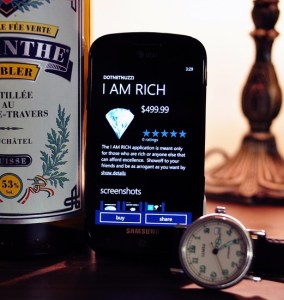
Back in 2008, an ambitious iPhone app developer launched “I Am Rich,” an iPhone application that cost $999.99 and did nothing but display a picture of a red gem. The point? Proving you had $1,000 to throw away on a virtual status symbol. Now, however, “I Am Rich” is back—only now it’s available for Windows Phone 7 devices, rather than the Apple iPhone. And it may be something less of a status symbol: for Windows Phone 7 devices, the software costs only $499.99.
The original ‘I Am Rich’ application garnered fame both for its high price—the highest fee an app in Apple’s App Store could charge—but also for being one of the first applications Apple summarily removed from the App Store. A total of eight people purchased the original ‘I Am Rich;’ Apple apparently refunded at least two of the purchases.
Although ‘I Am Rich’ won’t be taken seriously by most mobile-savvy consumers, the application and others like it highlight some distinctions between a “curated” experience like the Apple App Store and the comparative free-for-all of mobile stores like the Android Marketplace. Although developers have consistently chafed at the restrictions and obscurity of Apple’s application approval process, part of the appeal of Apple’s iOS platform is arguably a less-confusing marketplace that’s less likely to contain offerings intended to prey on customers. Microsoft’s response to applications like ‘I Am Rich’ will help set a tone for the Windows Phone 7 platform: will the company try to protect consumers and its marketplace experience, let any developer with .NET tools run amok, or attempt to strike a balance?
For the record, not all $999.99 iPhone apps are bogus: BarMax seems to have built a profitable business selling $999 iOS applications that help aspiring lawyers prepare for bar exams.


